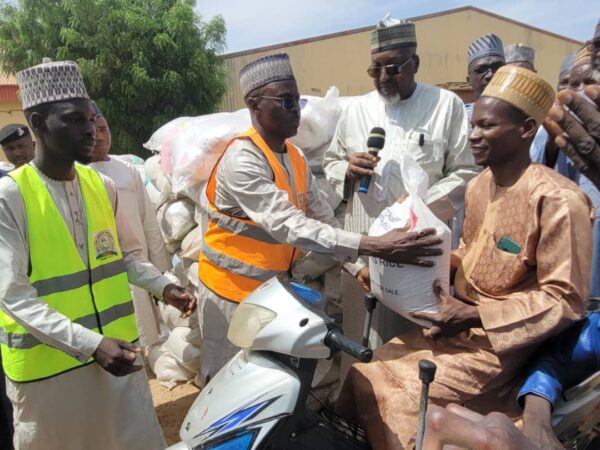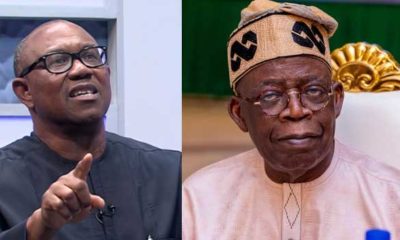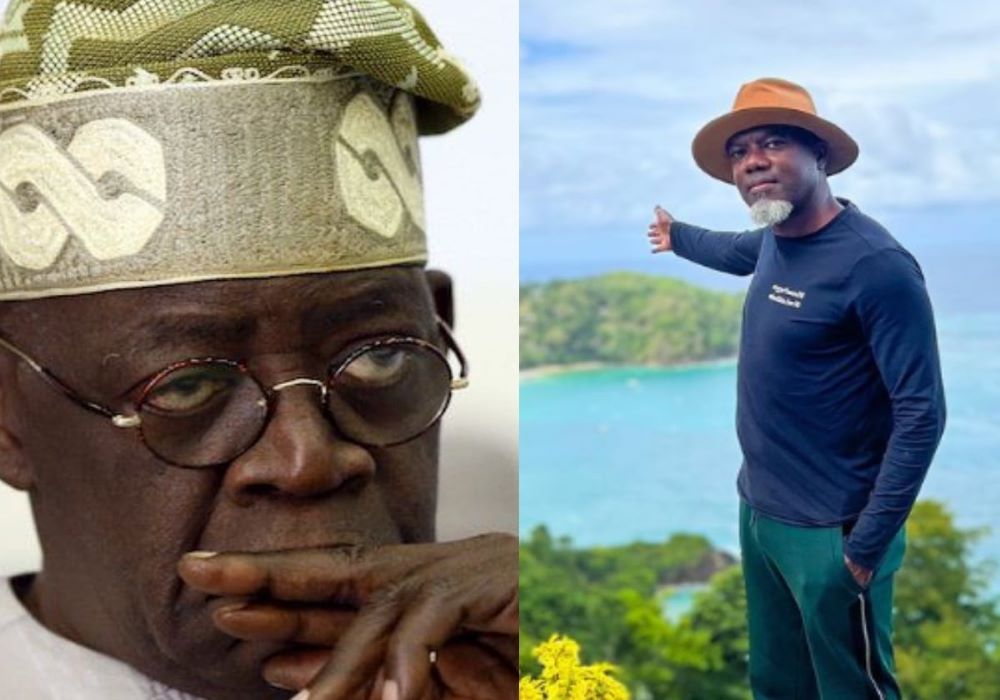Business
Tinubu Seeks ₦1.767tn Loan to Tackle 2024 Budget Deficit
President Bola Ahmed Tinubu has approached the National Assembly for approval of a fresh external borrowing plan totaling ₦1.767 trillion.
The loan, if approved, will help finance the ₦9.7 trillion deficit in the 2024 budget.
The request was presented during Tuesday’s plenary by the Speaker of the House of Representatives.
READ ALSO: NYFPA Condemns Omokri’s Remarks on Pastor Becky Enenche, Demands Apology
Alongside the loan request, the president also submitted the Medium-Term Expenditure Framework and Fiscal Strategy Paper (MTEF/FSP) for 2025–2027.
Additionally, Tinubu proposed amendments to the National Social Investment Programme (NSIP) establishment bill, aiming to make the national social register the central tool for delivering federal welfare programs.
Debt Servicing Costs Skyrocket in 2024
Nigeria’s rising debt obligations have been brought into sharp focus with new data from the Central Bank of Nigeria (CBN).
The country spent $3.58 billion servicing foreign debt in the first nine months of 2024, marking a 39.77% increase from the $2.56 billion recorded during the same period in 2023.
May 2024 saw the highest monthly debt servicing payment at $854.37 million, a staggering 286.52% increase compared to May 2023.
The surge in debt servicing costs reflects a sharp depreciation of the naira, which weakened from ₦899.39/$1 in December 2023 to ₦1,470.19/$1 by June 2024.
Experts warn that the rising exchange rate and escalating international debt obligations place significant pressure on Nigeria’s fiscal sustainability.
State Debts Climb to ₦11.47tn by Mid-2024
The debt profiles of Nigeria’s 36 states and the Federal Capital Territory (FCT) have continued to rise, reaching ₦11.47 trillion as of June 30, 2024.
This marks a 14.57% increase from ₦10.01 trillion in December 2023, according to data from the Debt Management Office (DMO).
External debt for states and the FCT climbed from $4.61 billion to $4.89 billion during this period.
READ MORE: Osun 2026: Adeleke’s Camp Fires Back At Ganduje
However, domestic debt decreased from ₦5.86 trillion to ₦4.27 trillion. Lagos State remained the most indebted in foreign currency terms, holding 26.9% of the total external debt, valued at $1.24 billion.
In naira terms, state debts rose by 73.46%, reflecting the impact of the naira’s devaluation on repayment obligations.
States Overly Dependent on Federal Allocations
A BudgIT report on fiscal sustainability has revealed that 32 out of 36 states relied on Federation Account Allocation Committee (FAAC) transfers for at least 55% of their revenue in 2023.
Fourteen states were even more dependent, deriving over 70% of their revenue from FAAC allocations.
FAAC disbursements increased by 33.19% in 2023, reaching ₦5.4 trillion, contributing significantly to the total combined state revenue of ₦8.66 trillion for the year.
However, analysts have raised concerns over this heavy dependence on oil-driven federal allocations, warning of the financial risks posed by crude oil price shocks.
Lagos and Ogun States were exceptions, generating significant revenue internally and relying less on federal transfers.
Economic Implications
The federal and state governments’ growing reliance on borrowing and federal allocations signals deep fiscal challenges.
Analysts caution that President Tinubu’s proposed borrowing plan, combined with rising debt servicing costs and exchange rate pressures, may exacerbate Nigeria’s economic vulnerability.
Business
Dangote Cement Emerges Platinum Winner Of ICAN, NGX’s Corporate Reporting Award

For its excellence in corporate transparency and governance, Dangote Cement Plc has been honoured as the Platinum winner of the Institute of Chartered Accountants of Nigeria (ICAN) and NGX Regulation Limited (NGX REGCO)’s Corporate Reporting Award for the financial year ending 2023.
Organised by ICAN-NGX REGCO, the event was meant to celebrate excellence in corporate transparency and governance. It was a moment of positive appraisal for the Cement company’s adherence to corporate governance with other winners comprising MTN Nigeria, Seplat Energy, Stanbic IBTC Holdings, GTCO, Zenith Bank, United Bank for Africa, and International Breweries.
It was gathered that in the Corporate Reporting Award guidelines issued by ICAN-NGX REGCO, 30 listed companies were evaluated across three key categories with marks allotted for compliance.
ALSO READ: NGX Group Celebrates Former Directors, Moves To Strengthen Collaboration
The categories and allotted marks are; financial reporting taking 35 percent, corporate governance allotted 30 percent and sustainability reporting accounting for 35 percent.
Biztellers reports that the awards were ranked in Platinum, Gold and Silver categories.
Dangote Cement, according to the Assessment Panel, excelled in all the assessment parameters as it emerged the platinum award winner, MTN won Gold and Seplat Energy carted home the Silver award.
President of Institute of Chartered Accountants of Nigeria, Davidson Alaribe, the platinum award is conferred upon the overall top-performing company across all three categories. This prestigious recognition is reserved for an organisation that demonstrates excellence in corporate reporting, effectively addressing all key elements evaluated.
He explained that the final score is derived from a combination of weighted averages and a scoring matrix based on the rigorous and independent evaluations of individual assessors.
Said he, “This award underscores our unwavering commitment to promoting transparency, accountability, and sustainable corporate practices within, the Nigeria Capital Market.
“The demand for corporate entities to disclose their environment, social and governance (ESG) impact beyond the confines of their traditional financial reporting has grown exponentially in recent years. The shift reflects a global call for greater transparency, accountability, and sustainability in business practices.”
He then described the honourees as exemplary, stating that their achievements reflect a commitment to the highest standards in corporate reporting. According to him, they’ve gone beyond compliance to set a benchmark for trust, growth, and sustainability in Nigeria’s financial landscape.
In his remark, the Chief Executive Officer, NGX Regulation Limited, Olufemi Shobanjo described the award as the celebration of outstanding achievements in corporate reporting among the listed companies over the past year and that it has continued to underscore the commitment to promoting excellence and transparency in financial reporting.
According to him, effective corporate reporting is vital for fostering trust and accountability in the capital market as it enhances the investors’ confidence and promotes best practices within the industry.
Dangote Cement is Africa’s leading cement producer with 52.0Mta capacity across Africa. A fully integrated quarry-to-customer producer, with a production capacity of 35.25Mta in its home market, Nigeria. Obajana plant in Kogi state, Nigeria, is the largest in Africa with 16.25Mta of capacity across five lines; Ibese plant in Ogun State has four cement lines with a combined installed capacity of 12Mta; Gboko plant in Benue state has 4Mta; and Okpella plant in Edo state has 3Mta. Through recent investments, Dangote Cement has eliminated Nigeria’s dependence on imported cement and has transformed the nation into an exporter of cement and clinker, serving neighbouring countries.
Business
NGX Group Celebrates Former Directors, Moves To Strengthen Collaboration

The Nigerian Exchange Group (NGX Group) celebrated the extraordinary contributions of its retired directors, whose visionary leadership played a pivotal role in shaping the evolution of Nigeria’s capital market.
Biztellers reports that the ceremony, held on Wednesday, April 9, 2025, on the heels of the Group’s 64th Annual General Meeting (AGM) in Lagos.
It brought together a distinguished gathering of regulatory leaders, government officials, traditional rulers, and members of the diplomatic community.
The event underscored the NGX Group’s commitment to sustaining the legacy of innovation, operational excellence, and stakeholder engagement, principles championed by the honorees. Their foundational work continues to guide the Group’s mission to deliver long-term value and market growth.
ALSO READ: Oraganisers Unveil Gateway Games Logo, Theme Song, Mascot
In his opening remarks, Alh Umaru Kwairanga, Group Chairman of NGX Group, paid tribute to their enduring impact: “Tonight, we honor the remarkable men and women whose leadership, dedication, and foresight have left an indelible mark on our Exchange and Nigeria’s financial markets. Their legacies remain ingrained in our DNA and will continue to inspire our path forward.”
On his part, Abayomi Oluyomi, Commissioner for Finance, Lagos State, representing Governor Babajide Sanwo-Olu, emphasized the honorees’ broader economic influence.
“Their contributions extended beyond the Exchange, reinforcing Lagos’s position as Africa’s leading financial and economic hub,” he said.
In the same vein, Dr. Emomotimi Agama, Director-General of the Securities and Exchange Commission (SEC), acknowledged their transformative role, describing them as distinguished leaders.
Dr Agama said, “These distinguished leaders laid the groundwork for today’s dynamic, transparent, and globally competitive capital market. Their governance standards and bold decisions remain benchmarks for excellence.”
Adding royal commendation, His Imperial Majesty, Ooni of Ife, Oba Adeyeye Enitan Ogunwusi, Ojaja II, praised their national impact.
“As a custodian of tradition and progress, I celebrate these trailblazers whose wisdom and commitment have driven Nigeria’s economic advancement and inspired future generations,” the royal father noted.
In his contribution, Aigboje Aig-Imoukhuede, a former president of The Nigerian Stock Exchange and Chairman of Access Holdings Plc, reflected on their legacy.
“Capital markets are the backbone of thriving economies. The progress we see today stems directly from these directors’ vision, integrity, and leadership, which established enduring governance standards,” he pointed out.
A poignant moment came with a tribute to the late Bamofin Abimbola Ogunbanjo, former Group Chairman, whose leadership was instrumental in NGX’s demutualization and modernization.
Other key figures, including Oscar N. Onyema, former CEO of The Nigerian Stock Exchange and GMD/CEO of NGX Group, were also celebrated for steering the Exchange through landmark transformations.
Closing the event, Temi Popoola, Group Managing Director/CEO of NGX Group, remarked, “Tonight, we honor not only the architects of our past but also the partners shaping our future. To our retired directors, your legacies ignite the aspirations of tomorrow’s leaders. Together, we will continue building a market that embodies Nigeria’s innovation, resilience, and strength.”
With decades of collective service, the retired directors have propelled NGX Group into a modern, technology-driven exchange. Their contributions have strengthened governance, elevated investor confidence, and enhanced Nigeria’s capital market on the global stage, laying a robust foundation for sustainable growth and investment across Africa.
Business
Dangote Feeds 50,000 In Kebbi, Gombe States

In continuation of its 2025 Annual National Food Intervention Programme, the Aliko Dangote Foundation (ADF), has distributed 50,000 bags of rice to poor and vulnerable families in Kebbi and Gombe States.
Flagging off the distribution of the intervention in Aliero Local Government Area of Kebbi State on Thursday (yesterday), the Kebbi State Commissioner for Special Duties, Alh Zayyanu Aliero, said the gesture was in line with the core values of the Foundation’s founder, Alh Aliko Dangote.
“This is commendable gesture, especially as it will improve the living conditions of the poor and most vulnerable people in the state.
“The distribution is in collaboration between the Foundation and the state government to ensure that the food reaches the most vulnerable individuals in each of the 21 LGAs of the state,” he said.
ALSO READ: Uromi Killings: FG, Edo State Set Up Fact-Finding Committee
The commissioner lauded the ADF for the kind gesture, noting that it was the second edition of the foundation’s gesture to the vulnerable people in the state.
He disclosed that, “Out of the 25,000 bags of the rice allotted for the 21 LGAs of the state, 20 LGAs would get 1,000 each while Birnin Kebbi LGA, which is the highest in population, will get 3,000 bags and the other vulnerable people will get 1,000 bags of the rice.
“The distribution formula we have adopted for all the LGAs is, 150 bags for persons living with disability, 100 for deaf, 100 for blind, 20 for leper, 10 for albino people; 120 for imams, 100 for traditional rulers, divorcees 100, widows 150, Dan-Agaji group 50, and other vulnerable 100,” he noted.
Zayyanu Aliero explained that the partnership had helped the government to reach vulnerable residents efficiently, through community structures that understood local needs.
The commissioner revealed that Gov. Nasir Idris, “has introduced various initiatives to mitigate the economic challenges facing the people in recent times in the state.”
On their part, the Chairman of Aliero and Gwandu LGAs, Alhaji Abubakar Jadi, represented by his Vice Alhaji Aliyu Abubakar, and Alhaji Atiku Ahmad-Mandiya, lauded the foundation and the efforts of the state government for providing succour to the needies and the less- privileged members of the LGAs in the state.
They urged the beneficiaries to continue praying for the state and the nation, saying Gov. Nasir Idris’ administration remained committed to supporting vulnerable communities.
On behalf of the beneficiaries, Alhaji Anas Gwandu, thanked Alhaji Aliko Dangote for providing the food item, while praising him for thinking it wise to intervene in the lives of the beneficiaries.
Anas appealed to other well-to-do individuals to emulate Dangote by supporting those in need.
“As I am talking to you now, we have more than 600,000 people living with disabilities and they need special attention and assistance.
“The gesture as such will alleviate some of the challenges face by the poor, widows, divorcees, and most vulnerable people in the society, hence they need for all our wealthy individuals to emulate the foundation’s gesture,” he urged.
Meanwhile, in Gombe State, the donation was handed over to the state government, through Alhaji Abubakar Inuwa Kari, the Chief of Staff to Governor Muhammadu Inuwa Yahaya, to oversee its distribution to the targeted beneficiaries, which includes widows, orphans, and other disadvantaged groups.
At the flag-off ceremony, Governor Inuwa Yahaya, represented by the Chief of Staff, Government House, Alh. Abubakar Inuwa Kari, expressed profound appreciation to the Aliko Dangote Foundation and the Chairman of the Dangote Group, Alh. Aliko Dangote, for his continued generosity in assisting the needy, particularly in Gombe State.
He noted that the foundation’s intervention is in line with his administration’s commitment to supporting the poor and vulnerable, especially during the sacred month of Ramadan.
He further commended the timeliness of the Aliko Dangote Foundation’s donation, emphasising that the distribution would follow the existing framework used in previous exercises to ensure equitable reach.
“When the commodities were handed over to the state government, we already had an established distribution structure with standing committees that had successfully handled previous exercises,” he noted.
Governor Yahaya directed that the rice be distributed using the same formula, which has consistently ensured efficiency and transparency in reaching the intended beneficiaries.
He urged the committee members to ensure that this round of distribution benefits a different set of vulnerable persons from those who received aid in previous exercises.
“Let this palliative go to a different set of beneficiaries so that more people can also benefit from this gesture,” he instructed.
He further charged committee members across the LGAs and wards to uphold transparency and accountability in executing their duties, while calling on the general public to continue praying for the progress and prosperity of Gombe State and the nation.
Earlier, the Executive Secretary of the Gombe State Emergency Management Agency (SEMA), Alhaji Abdullahi Haruna, reaffirmed that all donated food items would be distributed directly to the intended beneficiaries.
On behalf of the Chairmen of the 11 Local Government Areas of the state, Chairman of Gombe Local Government, Barr. Sani Ahmad Haruna, expressed appreciation to the Aliko Dangote Foundation for the continued support.
Barr. Sani Haruna assured that the successes recorded in previous Ramadan distribution exercises would be replicated, guaranteeing that the items reach those in need.
In their separate remarks, representatives of various beneficiary groups, including the Secretary of Jama’atu Nasril Islam (JNI) in Gombe State, Alhaji Saleh Damburam; Chairman of the Christian Association of Nigeria (CAN), Rev. Joseph Shinga ; the Acting Chairman of the Association of Persons with Disabilities (PWDs), Abdullahi A. Bello; and representatives of civil society organisations, lauded the Dangote Foundation for the initiative.
They appreciated the foundation for recognising the targeted groups and coming to their aids, especially at this critical time.
“We are forwarding our appreciation to the Dangote Foundation, who in their wisdom donated these rice to be distributed to the people of Gombe state, particularly those in dire need,” Alhaji Saleh Danburam, the state JNI secretary stated.
Also, Chairman of the state chapter of CAN, Joseph Shinga said, “I wish to express our deepest gratitude to the Aliko Dangote Foundation for extending this gesture to our people. On behalf of CAN, the youth wing and the ‘Zumuntan Mata we thank you all who sat down and brought out the sharing formula.”
A representative of the Gombe Network of Civil Society (GONET), Ibrahim Yusuf (3000) stated that the donation comes at a crucial time when the targeted beneficiaries are grappling with food and economic hardship.
The event featured the symbolic allocation of palliatives to six organizations, namely: JNI, CAN, FOMWAN, PWDs, CSOs, and Hisbah alongside the formal handing over to state and local government committees for onward distribution across LGAs, wards, and polling units.

















